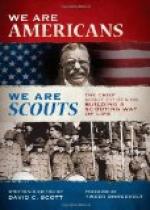Capt. McKee now called the men I had selected, and one of the others to come to him, and when they came, he told them of the arrangements we had made and told them they must look to me for their instructions in the future if they were willing to accept the positions as assistants. They all said they were willing to undertake the job if I was willing to teach them what I wanted them to do. One of them said, “Mr. Drannan, when I make a mistake, I want you to tell me of it at once, for I want to do right in everything as much as you will want me to.”
I answered that we would commence by learning the private signals to be used when in the Indian country, which I would teach them tomorrow night.
After we went into camp the next morning, just as we were getting ready to pull out, two men came and told us that the Indians were doing a great deal of damage about seventy-five miles in a southwestern direction from Fort Worth. He said they had been making raids on the settlements every few days for several weeks and had killed several people, and the settlers were kept in a constant fear day and night.
As the Capt. was well acquainted all over the country, he knew just where to direct our course, and we pulled out in that direction making as good time on the way as possible.
The second night after we left Fort Worth, we camped on the edge of one of the settlements where the Indians had been making so much trouble. As soon as we were settled in camp, I rode to a house that was perhaps a half a mile from us to get some information regarding the Indians. The man of the house said that the Indians had come every ten days and sometimes oftener, and, said he, “The Indians do not try to kill the people as much as they did to steal the stock or anything else that they could get their hands on.”
I asked him what direction the Indians came from, and he answered that they invariably came from the west. I asked whether they were in large or small bands. He said there were seldom more than thirty in a band, and they always came up that river, and he pointed to a small stream not far from us.
I rode back to camp and told Capt. McKee what I had learned. He said, “The Indians must be very sure that no one will be after them now. What do you think is the best plan to adopt?”
I told him that I thought we had better travel down the stream that the Indians seemed to make a pathway of, for one day at least, and go into camp at night, and I would scout around the country and find their main trails, for I was satisfied that only a part of the band came to this settlement. “And what we want to do, Capt., is to cripple them so they would let this settlement alone, and we can do it if we can catch the main band.”
We pulled down this little stream and traveled in that direction.
All day we saw lots of Indian sign all the way, but none of them was fresh. As we were going into camp that evening, I told Capt. McKee that my scouts and I would take a circle around the camp and see if there were any Indian camp fires to be seen.




